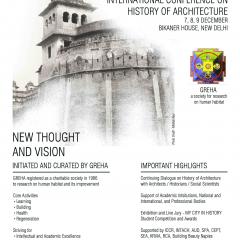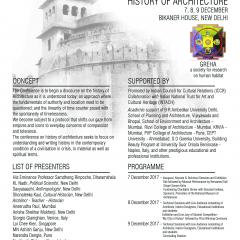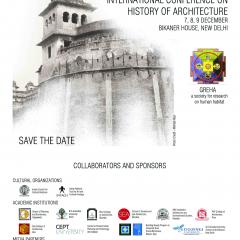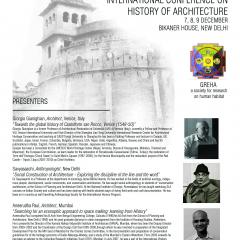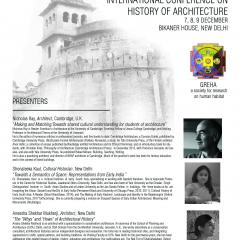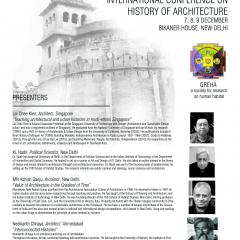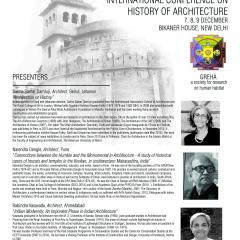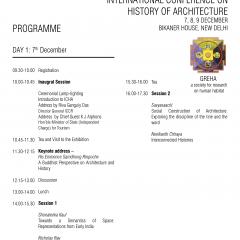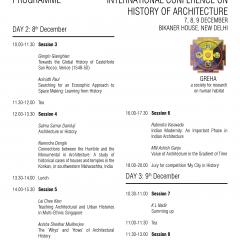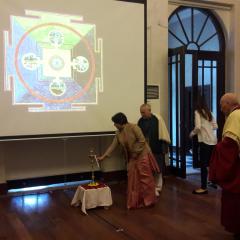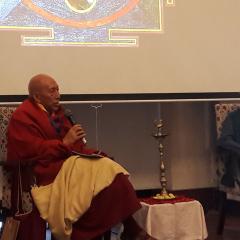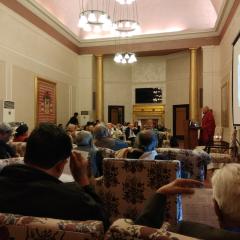A three day conference is planned to discuss the study of history of architecture, with the participation of national and international scholars of eminence. The Indian Council for Cultural Relations (ICCR) has promoted this venture and promised financial support to cover costs of international travel. Collaboration is agreed with the Indian National Trust for Art and Cultural Heritage (INTACH),the B R Ambedkar University Delhi and Building Beauty Program at University Suor Orsola Benincasa, Naples, Italy. We are seeking collaboration with the Indian Institute of Architects (IIA) and several educational and cultural institutions.
The conference is envisaged not only as an intellectual convergence, but also as a cultural event. The proposed National Museum of Architecture which is being promoted by Greha in collaboration with the Council of Architecture (CoA), Indian Institute of Architects (IIA), Indian National Trust for Art and Cultural Heritage (INTACH), National Institute of Urban Affairs (NIUA), Institute of Town Planners India (ITPI), Institute of Urban Designers India (IUDI), Indian Society of Landscape Architects (ISOLA),Institute of Indian Interior Designers (IIID), will be showcased at this event.
In addition to our invited scholars, we expect the participation of professional practitioners, academics, students, and connoisseurs of art and culture, to the extent of about 100 persons. We expect that the interest generated by the National Museum of Architecture proposal will become an accelerator for the discourse on History of Architecture.
The dates for the conference on are 7, 8, and 9 December 2017. The venue is Bikaner House, New Delhi.
Please mail us at grehadelhi@gmail.com for registration information
Concept
The history of architecture of the subcontinent of India has been written mainly by art historians and archaeologists of European origin. This is not surprising since architecture as a contemporary discipline was reinvented in India by Europeans.
In recent years attempts have been made by architects as well to represent the history of architecture in the subcontinent. It is remarkable that although there are over 450 schools of architecture in India, there is no serious learning of architectural history, since no relevant texts are available. This creates a vacuum in the appreciation of architecture, and we are deprived of any form of connoisseurship in this discipline which is a foundational cultural enterprise.
Perhaps the learning of history of architecture is in a similar bind, although for different reasons, in other parts of the world. The problem seems to be tied up with the vacuum of theoretical inspiration in the discipline as a whole.
In ancient societies, where the vernacular is still alive – a condition prevalent in many parts of the world – the transition from the past to the present is not easy to distinguish.
The writing of history in such a situation requires an approach where the fundamentals of authority and location need to be questioned; and the linearity of time counter posed with the spontaneity of timelessness.
The writing of history becomes subject to another protocol, one that shifts our gaze from empires and icons to everyday concerns of compassion and tolerance.
The instruments of researching the past, therefore, may rely as much on oral accounts, myths and folklore, as on texts of itinerant scholars deriving their authority from monarchs.
Monuments and sites may be understood as transitory phenomena whose significance is located in a cosmological framework.
The conference on history of architecture seeks to focus on understanding and writing history in the contemporary condition of a civilisation in crisis, in material as well as spiritual terms.
History to be understood as the continuum of human civilisation in an evolving universe.
List of Presenters
National
- Neelkanth Chhaya, Ahmedabad
- Narendra Dengle, Pune
- Rabindra Vasavada, Ahmedabad
- Shonaleeka Kaul, New Delhi
- Anisha Shekhar Mukherjee, New Delhi
- KL Nadir, New Delhi
- Aneerudha Paul, Mumbai
- Savyasaachi, New Delhi
- MN Ashish Ganju, New Delhi
International
- His Eminence Professor Samdhong Rinpoche, Dharamsala, India
- Giorgio Gianighian, Venice, Italy
- Nicholas Ray, Cambridge, U.K.
- Lai Chee Kien, Singapore
- Salma Samar Damluji, Beirut, Lebanon
greha/October 2017



